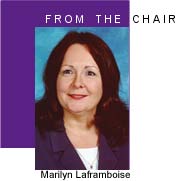

 |
Change in government signals opportunitiesA new government provides a possibility for change among education's various partners. The College has an important role to play and we look forward to improved partnerships and a greater consultation. |
|
by Marilyn A. Laframboise If you're expecting swift and sweeping change in public education because of a new government, think again. Better yet, ask, "Is that what we really want?" There are no panaceas or magic elixirs that will cure all ills. The changes required in education today go beyond a simple change in government. Progress, particularly of the kind favoured by educators, comes after a period of consultation. Honouring the voices of its 189,000 members, the College speaks for the teaching profession and acts in the public interest. It recommends and promotes policies that ultimately benefit Ontario students. It speaks with authority on professional matters affecting teachers. I hope that the change in government signals new opportunities to discuss and debate issues and ideas. I expect the teaching profession's regulatory body to be consulted regularly as the government considers matters of teacher professionalism. I also trust that we will be able to raise issues on behalf of the profession and have a fair hearing on matters that teachers believe can advance teaching and learning. The College has reached a critical point in its development and has earned the right to be a catalyst for the profession's growth. It can and must stand alongside other educational partners as we move forward. We have well-informed opinions on matters of teacher recruitment and professional development. We have recommendations to make regarding support for new teachers, requested by newly certified teachers themselves. We want to see changes to regulations that reflect what is actually happening in classrooms today. We want to deal with concerns regarding the entry to the profession test and we want to help address teacher shortages in critical areas by assisting teachers who have been trained outside Ontario to qualify for certification here. The innovative leadership we seek to provide is solution driven. It reflects the voices of educators and the needs of the classroom and aspires to positive outcomes for students. We believe that partnerships are the cornerstone of progress. Effective partnership entails a willingness to work towards the common good. It requires listening closely, respecting differing viewpoints and working with others to realize good ideas regardless of their source. The advancement of the profession will come from camaraderie, by people putting their heads together to address concerns. It's not excessively optimistic to suggest that all of us in education could work together as joint advocates for students. Strong College governance affects and influences every facet and every member of the teaching profession. We recognize the need to consult with our members more often so that the discussions we do engage in on their behalf reflect their ideas and concerns. Last summer's member survey is a good example of that consultation. It was the first mass effort by the College to seek member opinion on a variety of issues and it received positive media coverage in national newspapers, on a provincial television broadcast and in community newspapers around Ontario. It came at a key time - as school resumed in September - and is a powerful example of speaking out for teachers. This kind of consultation needs to continue in order to support our discussions with the government and other education organizations. We need to do more. The College is an important voice in public education and the growth of the teaching profession. It is the only organization that speaks on behalf of members in all systems - French and English, elementary and secondary, public and private. When we make recommendations to the government, we do so on behalf of all certified, qualified educators and after having consulted with them. You can expect the College to stand up for the profession in the public interest and to participate actively in discussions regarding change that affects our members and the future of the profession.
|